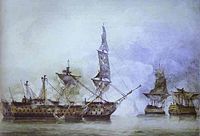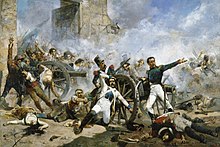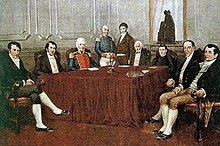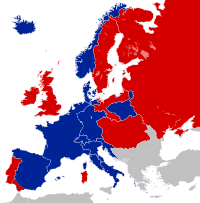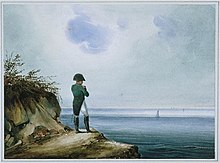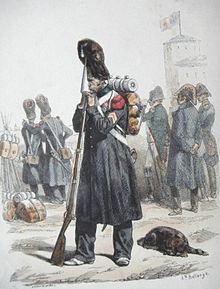First French Empire
The First French Empire, also known as the Napoleonic Empire or Napoleonic France, was the monarchical government established by Napoleon Bonaparte after the dissolution of the First French Republic in 1804. At its height, the Empire comprised most of Western and Central Europe, as well as possessing numerous colonial domains and client states. The regime lasted from May 18, 1804 —Napoleon's proclamation as Emperor— until July 7, 1815, the day King Louis XVIII's forces entered Paris.
The presence of Napoleon Bonaparte, a feared soldier who embodied revolutionary ideals, aroused fear in the absolutist monarchies who, fearing the spread of the ideas of the French Revolution and sponsored by the United Kingdom, did not cease to make him the war to France. However, they met with a series of humiliating defeats at the hands of the emperor. By the year 1812, Napoleon already controlled all of western and central Europe, with the exception of Great Britain and Portugal. With his conquests, several absolutist governments were extinct and the ideas of the French Revolution spread throughout Europe.
Napoleon cherished the desire to transform France into a hegemonic power, and he strove to achieve it with innate military genius and leadership skills. He maintained a constitutional government, which reserved immense political power for the figure of the emperor, inspired by his popularity and his close relationship with the army. Even so, the empire was founded and governed on the basis of the French revolution: Napoleon was elected sovereign through a plebiscite, establishing a continental and centralized state very comparable to the old Roman Empire. His regime ended after consequent military defeats, after being forced to confront almost all of Europe as a whole. However, the influence of Napoleonic France lasted beyond its existence, in the following decades a series of popular revolutions would break out throughout the continent that would put a definitive end to despotism.
Internally, Napoleon managed to restore political stability in France and created an infrastructure capable of boosting the businesses of the French bourgeoisie; under his rule, France would reach its greatest splendor. He ended the age-old feudalism of the monarchy and created a nobility of merit comprised of those deemed competent and worthy of such position. He promoted economic liberalism, construction, education, arts and laws, with his famous civil code and commercial code (the set of French civil law and commercial law regulations being a single legal text) one of his greatest legacies. to humanity, since today it inspires almost half of the legal systems in the world.
The Road to Empire
Beginnings and first campaigns of Napoleon Bonaparte
Napoleon Bonaparte was born in Ajaccio, Corsica, in 1769, one year after the island of Corsica passed into French rule. He studied at the French Military Academy and would succeed in projecting his military genius only after the French Revolution (1789). Napoleon was promoted to general at just 24 years of age after the siege of Toulon in 1793. In 1795, at the age of 26, he commanded the French army that conquered part of the Italian peninsula (Italian Campaign) and Egypt (Campaign of Egypt) between the years 1796 and 1797.
Napoleon Bonaparte's coup d'état: 18 Brumaire
Ten years had passed since the start of the French Revolution, but France still had not achieved the desired political, economic and social stability. On the one hand, order was disturbed by popular pressure, which demanded measures capable of ending poverty and misery in which a large part of the rural and urban population lived. On the other, the bourgeoisie, the social class that had led the French Revolution, saw their businesses succumb due to the constant economic and political crises. To complete the scenario, various European countries were conspiring and fighting to put an end to the revolutionary regime in France. In the midst of this chaos, a young general named Napoleon Bonaparte stands victorious on the battlefield.
With the respect and fame acquired on the battlefield, at that time Napoleon Bonaparte represented the ideal political alternative to solve the problems of the French. He was seen as a hero by the population and considered a leader by the bourgeoisie. Backed by his great popularity, he commanded on November 9, 1799 (18 Brumaire of the year VIII, according to the French revolutionary calendar) a coup d'état against the government of the Directory known as the "Coup d'état of November 18". brumary".
Consulate Established: Napoleon Bonaparte "First Consul"
A month later Napoleon Bonaparte would assume power, entering into force a new constitution and creating the Consulate, a body that replaced the Directory in the government of France. It consisted of three consuls, of whom Napoleon became the "First Consul" and virtual dictator of France. Supported by a large part of the French population, he was invested with extensive powers. Napoleon sought to restore internal order, reorganize the public administration, and reduce inflation. With that, the economy would grow again. Normalizing relations with the Church was also another objective, broken since the year 1790. Another important measure of his government was the creation of the Civil Code of France, known worldwide as the Napoleonic or Napoleonic Code, it brought together principles of Roman Law, royal orders and civil and criminal legislation in force during the French Revolution.
Start of the First Empire
At the external level, Napoleon Bonaparte managed to restore peace through military victories and diplomatic negotiations, neutralizing France's adversaries. In this area, one of the most outstanding aspects of the government was the peace agreement signed in 1802 with Great Britain, which put an end to years of conflict, which would further increase its prestige. In 1804 Napoleon (who had become consul for life two years earlier) was authorized, by means of a plebiscite, to assume the title of Emperor of the French. Napoleon's main reforms were:
- Establish a centralist government system.
- Pacificing French society: allowed the entry of people who had been exiled from the country.
- Stabilize taxes: created the Bank of France and the Code of Commerce.
- Promote a centralized and political educational system.
- Create the Civil Code to regulate coexistence among citizens.
- Restore relations with the Catholic Church.
Height of Empire: The Napoleonic Wars
The peace signed with England was short-lived. In 1803, England allied with Russia and Austria to fight the France of Napoleon Bonaparte. Two years later, Napoleon organized a large expedition to invade English territory, but the combined naval forces of France and Spain (France's ally) were defeated at the Battle of Trafalgar, where the famed English Admiral Nelson was killed. Following this setback, Napoleon abandoned (although he did not forget) his plans to invade the British Isles, and turned his attention to his enemies on the Continent.
On land, however, the French army defeated Russian and Austrian forces at the Battle of Austerlitz, 1805 (known as the Battle of the Three Emperors: France, Russia, and Austria). After Austerlitz, Austria signed the Treaty of Pressburg, leaving the coalition. This cost Austria ceding Venice to the (Napoleonic) Kingdom of Italy and Tyrol to Bavaria.
With Austria's withdrawal from the war came a stalemate. The Napoleonic army had an unbeatable record of victories on land, but the full strength of the Russian army had not yet come into play.
The Napoleonic Wars brought many changes to the map of Europe, including the end of the Holy Roman Empire, which had existed since the X century . In his place, Napoleon Bonaparte established the Confederation of the Rhine. In general, the regions dominated by Napoleon ended up forming governments faithful to the French emperor. Thus his area of influence increased more and more.
Continental Blockade of Great Britain
Great Britain, for its part, continued to be France's main opponent. With a powerful naval force and a developed economy, she resisted the attacks of Napoleon Bonaparte. Trying to reduce the forces of his adversary, Napoleon Bonaparte, in 1806 he imposed the Continental Blockade, which decreed the closure of European ports to English trade. With this measure, Napoleon Bonaparte hoped to collapse the British economy to defeat it later militarily. As a consequence, the market for the French bourgeoisie would also be enlarged.
The Fourth Coalition
The Fourth Coalition (1806-1807) of Prussia, Saxony and Russia against France was formed only a few months after the collapse of the preceding coalition. King Frederick William III of Prussia made the decision to go to war independently of the other great powers. Napoleon threw the entire French forces onto the Rhine. They numbered about 160,000 men, a number that increased as the campaign against Prussia developed, and they moved with such speed that they virtually annihilated the Prussian army of about 250,000 men. The Prussian army was definitively defeated by Napoleon in the battle of Jena, and by Marshal Louis Nicolas Davout in the battle of Auerstädt (October 14, 1806). This last battle faced a single corps of the French army that defeated the main body of the Prussian army. At Jena Napoleon only fought a detachment.
The next stage of the war led to the expulsion of Russian troops from Poland and the creation of the new Grand Duchy of Warsaw. Napoleon then headed north to engage the remnants of the Russian army and attempt to capture the new Prussian capital of Königsberg. A tactical move in the battle of Eylau, between February 7 and 8, forced the Russians to a subsequent surrender. Napoleon then led the Russian army to the Battle of Friedland, on June 14. After this defeat, Alexander was forced to sign peace with Napoleon at Tilsit on July 7, 1807.
At the Congress of Erfurt (1808), Napoleon and Tsar Alexander I agreed that Russia should force Sweden to join the Continental Blockade, which led to the Finnish War and the division of Sweden across the Gulf of Bothnia. The eastern part was annexed by Russia into the Grand Duchy of Finland.
Napoleon Bonaparte's invasion of the Iberian Peninsula
In order to enforce the Continental Blockade, Napoleon Bonaparte put into practice a policy of interventions and annexations. In the year 1807, he ordered the military intervention in the Iberian Peninsula, directed at Portugal (an ally of England), but in the course it would imply the invasion of Spain, on whose throne he placed his brother José Bonaparte; The Spanish resisted the imposition of the new king and rose up in arms against the French. Despite the repression undertaken, the Napoleonic forces failed to definitively defeat the Spanish. In the same year, Napoleon decided to invade Portugal, which was the initial plan, which had refused to accept the Continental Blockade against England. The country was occupied without difficulty, but the Portuguese royal family escaped to their possessions in America (Brazil) under escort. by English ships. The French, however, did not stay long in Portugal due to continued Anglo-Portuguese attacks.
The people of Madrid rose up against the Napoleonic troops on May 2, 1808 and this uprising was the beginning of numerous revolts and battles throughout the country that months later led to the first major defeat of the French forces in the battle of Bailén, Napoleon himself commanded the forces that invaded Spain and defeated the army of this country; he also defeated the British army that came to the aid of Spain.
This conflict caused great human (estimated at 300,000 casualties) and economic wear and tear on France. It is estimated that 10% of the casualties on both the Spanish and French sides occurred during the two sieges of the city of Zaragoza, between June 15, 1808 and February 21, 1809.
Napoleonic influence in America
In addition to the repercussions in Europe, the Napoleonic invasion of the Iberian Peninsula would have important consequences in colonial America. The fall of the Spanish king ended up being the trigger that would lead to the creation of government juntas, to govern themselves, in Spanish America, which would later lead to the independence of the Spanish territories in America.
In the rest of the continent, the Louisiana Purchase and France's handling of Haiti's independence process had an enormous influence on the continent's development.
Napoleon Bonaparte, whose power in France was growing, wanted to re-establish the domination of the French colonists in Saint-Domingue and thus manage to recover the strength of the sugar industry. He sent an army of 25,000 soldiers to Hispaniola under the command of his brother-in-law Carlos Víctor Leclerc (1772-1802) who commanded the expedition in December 1801. The French failed to restore slavery in Saint-Domingue. Thanks to the military power built in Louverture's time, the blacks defeated the French at the Battle of Vertieras in 1803. On January 1, 1804, a new leader, Jean-Jacques Dessalines, proclaimed the independence of the country, which he renamed its aboriginal name Haiti which means mountainous land.
In 1803, Louisiana was a territory of approximately two million km², bordered to the north by British possessions, to the east by the Mississippi River, and to the south and west by New Spain.
The United States was looking for a way to control navigation on the Mississippi River, a fact that led it to start negotiations with the regime of Napoleon Bonaparte, then first French consul. For its part, France was in a hurry to get rid of this colony that it had obtained only two years before (by means of the Retrocession Treaty with Spain, which forced the return to France of the territory acquired by Spain after the Seven Years' War), since Haiti had declared its independence from France, a situation that made it impossible for the French army to defend Louisiana from this stronghold. Faced with this situation, Napoleon then preferred to sell the colony to the Americans than run the risk of losing it to the English.
Decline of the Empire
In 1810, despite the problems in the Iberian Peninsula, the French ruled much of Western Europe. From that time, however, a succession of obstacles would eventually lead to the exhaustion of the empire. In France itself, the prestige of Napoleon Bonaparte was being shaken in all social strata as a result of the despotism of the regime and the continuous wars. Not only were the human casualties heavy, but also thousands of young men trying to escape military service.
When the opposition demonstrations intensified, the government resorted to censorship of newspapers, books, and police repression. These measures increased the discontent of the majority of the French.[citation needed]
The Sixth Coalition
Napoleon Bonaparte Invades Russia: Scorched Earth#34;
Externally, France was unable to overcome the resistance of the English, who frequently led military coalitions formed with other adversary countries such as Austria and Russia to defeat the French Empire. The Continental Blockade was also increasingly disrespected. Proof of this is that, in 1810, the Tsar of Russia, Alexander, broke with the agreement with France and promoted a rapprochement with England; in retaliation, Napoleon Bonaparte and his troops invaded Russia in 1812.
Despite taking Moscow, the French were not victorious. Upon their arrival, they found a deserted city on fire, and they did not get shelter to rest or food to replenish the forces of the troops and horses.
In this episode, Napoleon was caught by surprise, because the Russian army had resorted to the clever scorched-earth strategy: intentional destruction of the site shortly before the invasion to prevent the obtaining of supplies and the withdrawal of the military contingent to avoid an open confrontation with the invaders. The maneuver represented a disaster for the French army. With no way out, the Napoleonic troops left the city under a severe winter and almost all of them were annihilated by the sporadic attacks made by the Russian army from the rear, also by hunger and cold. Of the army of 650,000 armed soldiers that entered Russian territory in June, already in November it barely reached the figure of 27,000 men. Total victory this time was for the Russians.
Coalition Advances
In the Spanish War, with the battle of Vitoria (June 21, 1813), the French occupation of Spain was definitively ended by sir Arthur Wellesley's victory over Joseph Bonaparte, and the French They were forced to leave Spain by crossing the Pyrenees.
Seeing an opportunity in this historic defeat of Napoleon, Prussia returned to war. Napoleon believed he could create a new army as large as the one he had sent to Russia, and quickly reinforced his forces in the east from 30,000 to 130 000 men, later reaching 400,000. Napoleon inflicted 40,000 casualties on the Allied forces at the Battle of Lützen (May 2, 1813), and at the Battle of Bautzen (May 20-May 21).
In the Battle of Leipzig in Saxony (October 16-October 19, 1813), also called the "Battle of the Nations," 191,000 Frenchmen fought against more than 450,000 Allies, and the French were defeated and forced into retire to France. Napoleon fought in a series of battles, including the Battle of Arcis-sur-Aube, in France, but was gradually forced back by the superiority of his opponents.
The final stage of the campaign, the defense of France, brought the Emperor back to fight at the head of his troops against an immensely outnumbered enemy in the Six Days Campaign, which is considered by many to be the greatest campaign of all time. his entire career. Finally, his previous losses in Russia and Germany as well as the overwhelming number of allied forces were too great to be remedied in this last stage, and the allies ended up occupying Paris, which together with the treachery of the marshals forced the Emperor to abdicate..
Seventh Coalition against France: abdication and exile of Napoleon Bonaparte
The defeat of Napoleon's army strengthened England and its allies. Ruined, Napoleon Bonaparte had to renounce the French throne in 1814 and went into exile on the island of Elba. The coalition led by England would occupy France, restoring the Bourbon monarchy and placing Louis XVIII of France, brother of the deposed and guillotined king: Louis XVI, on the throne in 1793 during the French Revolution. At the same time, the victorious countries decided to meet and chart the destinies of Europe, organizing the Congress of Vienna where they reconfigured the map of Europe.
Reestablishment of the Monarchy in France
Allied troops entered Paris on March 31, 1814. Louis XVIII, however, could not walk, and so sent the Comte d'Artois to France in January 1814. Louis issued patents naming the Comte de Artois Lieutenant General of the Kingdom in the event that the Bourbons were restored. Napoleon I abdicated on April 11. Five days later, the French Senate invited the Bourbons to resume their place on the French throne.
Louis XVIII signed the Treaty of Paris on May 30, 1814. The treaty gave France its 1792 borders, which stretched east of the Rhine. It did not have to pay any war indemnities, and the occupying armies of the Sixth Coalition instantly withdrew from French soil. These generous terms would be reversed in the next Treaty of Paris after the Hundred Days (Napoleon's return to France in 1815).
The reestablishment of the Bourbon monarchy in France was followed by the return of nobles who had fled the country at the start of the French Revolution. Upon returning, the exiles wanted to recover their former rights and assets, which generated great popular dissatisfaction.
Return of Napoleon Bonaparte: Empire of a Hundred Days
Perceiving that the moment was propitious to intervene once more on the political scene, Napoleon Bonaparte fled from the island of Elba and, in March 1815, resumed government. The new government lasted barely one hundred days. The period known as the Hundred Days began when Napoleon left Elba and landed at Cannes on March 1, 1815. As he moved toward Paris, he gathered support wherever he went, eventually overthrowing the newly restored Louis XVIII without firing a shot. a single shot, being carried on the shoulders to the Tuileries Palace by the angry crowd. The allies immediately prepared their armies to face him again.
Reestablished in Paris, he promulgated a new constitution, more democratic and liberal than the one in force during the Empire. Many veterans responded to his call, beginning the confrontation against the allies again. The result was the Belgian campaign, which ended in defeat at the Battle of Waterloo on June 18, 1815.
Final defeat of Napoleon Bonaparte: exile and death on the island of Saint Helena
Napoleon Bonaparte was definitively defeated by the English general Wellington in the battle of Waterloo, in Belgium, in June 1815, and abdicated in favor of his son, Francisco Carlos José Bonaparte, proclaiming him Napoleon II. The short-lived nature of his father's new government prevented Napoleon II from returning to France to confirm his appointment and take over the inheritance. This time, the English, to whom he surrendered on July 15, would send Napoleon Bonaparte to a most distant place: the island of Santa Elena, in the middle of the Atlantic Ocean. He landed on it on October 17, and died there on May 5, 1821.
Administration
Emperor
"Emperor of the French" It is the title that was imposed on Napoleon in 1804 with the establishment of the First French Empire, lasting until 1815, the year in which the allied European powers allowed him to continue holding it, but territorially reduced to the Island of Elba; later he exercised it in the Hundred Days of 1815, concluding in his final defeat at the Battle of Waterloo.
Napoleon's son, Napoleon Franz Joseph Charles Bonaparte (1811–1832), was made King of Rome (1811–1814) and proclaimed Emperor as Napoleon II on June 22, 1815, following his father's abdication (as consequence of the defeat in the battle of Waterloo), ceasing to be so on July 7 of the same year, with the entry of the allies and supporters of Louis XVIII in Paris.
Government
Under the Empire, each minister worked directly for Napoleon: all power was in his hands. They are reduced to mere enforcement agents, and their job is to oversee the application of the laws.
To help ministers with overwork, administrations headed by state councilors (called Directorates General) were established; these are an independent part of the ministries. Thus, the General Directorate of Posts (in 1804), the Forestry Directorate (1805), the General Directorate of Renovation and Military Conscription (1806), the General Directorate of war supplies (1808) and the General Directorate of Mines (1810), joining the branches created under the consulate.
However, Napoleon's authority did not reach its definitive consolidation solely by virtue of reforms. The dictatorship established itself in power with the army as the backbone, which through conscript levies had, between 1806 and 1812, 1.3 million soldiers, 41% of the men forced into military service, and a law-abiding and orderly bureaucracy. centralized.
But there was no political freedom. Napoleon relentlessly persecuted internal enemies and critical voices - Madame de Stäel and Chateaubriand - with rigorous press censorship and an effective police apparatus.
Bonapartism, that is, a plebiscite dictatorship that only admitted certain advisory groups lacking real jurisdictional powers, developed an extremely intense reformist activity, which excluded really powerful political rivals. In the most decisive moments of his reign, Napoleon invariably sought the ratification of the masses, such as when he decided to give life (1802) and succession status to his consulate, or when he wanted to create the empire (1804). In any case, the liberalized and equalized bourgeois society was consciously subjected to a process of depoliticization, while an omnipresent and authoritarian state was built, with monarchical edges.
Legislative assemblies
The empire maintained the institutions created in the consulate, such as the conservative Senate (Sénat conservateur), the Legislative Body (Corps législatif), the Tribunat and the Council of State (Conseil d'État).
Conservative Senate: The mission of the Senate is to guarantee the constitutionality of the laws: it is the "conservative of the Constitution" and can, as such, vote against the promulgation of a text voted by the Legislative Body. During the Consulate, it is up to him to designate the Consuls; under the Empire, it may be necessary to elect a regent, or even a new Emperor if the incumbent dies without a direct heir.
Legislative Body: The role of this assembly is exclusively legislative: it consists of approving or not, but without debating, the laws that are submitted to it after examination by the Tribunat. The powers of the Legislative Body increased after the suppression of the Tribunato (1807).
Tribunat: Its function is only to deliberate on bills before they are adopted by the Legislative Branch, bills came from the Council of State. The procedure to adopt the law was organized on the principle of division of labor between the Tribunal, which discussed the projects without voting on them, and the Legislative Branch, which voted on the projects without discussing them. This assembly is removed in 1807.
Council of State: The Year VIII Council of State is responsible for preparing bills and assisting the Head of State in resolving administrative disputes. The members of the Council of State present and defend government projects before the legislative body. Pampered by Bonaparte, during the Consulate and the Empire, he will have a key role in drafting the Civil Code.
The departments
At the proclamation of the Empire on May 18, 1804, France had 106 departments. In addition to the provinces of the old regime divided into eighty-three departments and the Venassin County, it has the conquests of the French Revolution with Belgium and Luxembourg divided into nine departments, the left bank of the Rhine divided into four departments, the reunion of the Duchy of Savoy, the county of Nice and the Republic of Geneva give three departments, Piedmont formerly belonging to the kingdom of Sardinia is divided into six departments.
Institutional Work
In 1801, the concordat was signed between Napoleon and Pope Pius VII. On March 21, 1804, the French Civil Code was promulgated. In 1806 the Labor Court. In 1808 Napoleon created the University, a state institution.
Laws
- The Napoleonic Code (French Civil Code).
- The Labour Court
- The Code of Civil Procedure
- The Court of Cassation
- The Trade Code
- The Criminal Code
Material Works
- Road works: Mont Cenis road, Simplon, Mont Genevra, continuing the construction of roads began in the 18th century.
- Port works: Antwerp, Dunkirk, Cherbourg.
- Water courses: channel of l'Ourcq, channel of Nantes to Brest.
- Arc de Triomphe.
- Bridges: Bridge of Arts the bridge of Jena and the Austerlitz bridge in Paris, stone bridge in Bordeaux.
- Brongniart Palace and Vendome column.
- Foundation of the new city of La Roche-sur-Yon.
- Cemeteries, Paris morgue.
Legion of Honor
The Legion of Honor (in French, Légion d'Honneur) is the best known and most important of the French distinctions. It was established by Emperor Napoleon I of France in 1804.
On May 20, 1802, the consul Napoleon Bonaparte instituted the national order of the Legion of Honor, thus returning to public decorations, since those of the Old Regime were abolished with the Revolution of 1789. On July 15, In 1804 in a grandiose ceremony at the Hôtel des Invalides in Paris, Napoleon awarded the first medals of the Legion of Honor to marshals, soldiers, war invalids, scientists, artists and writers, with outstanding merits.
Demographics
It is estimated that by 1812 the population of the French Empire was 96,672,000, counting the imperial territories as well as the satellite territories. France had a population of approx. 27 million people, thus making up the most populated territory of the Empire. The most populous city in the French Empire was Paris, with a population of 750,000, followed by Naples with 435,000, this, in turn, followed by: Rome with 369,000, Madrid with 309,000. and Berlin with 280,000 inhabitants.
Population of the French Empire by current regions
- Germany: 23 000.
- Austria (Tirol and Vorarlberg): 172 000 hectares.
- Belgium: 3 500 000 hab.
- Croatia: 500 000 hab.
- Slovenia: 200 000 hab.
- France: 27 900 000 hab.
- Spain: 10 800 000 hab.
- Italy: 18 000.
- Switzerland: 3 000 000 hab.
- Netherlands: 4 900 000 hab.
- Poland: 4 500 000 hab.
Armed Forces
Napoleonic Army
The Grande Armée was the army commanded by Napoleon during the Napoleonic Wars. Originally, the Grande Armée consisted of six corps under the command of Napoleon's marshals. As Napoleon conquered more and more of the continent, the army grew in size, peaking at 600,000 men in 1812, just before the invasion of Russia in the War of the Sixth Coalition.
Before the late 18th century century, there was generally a lack of organizational support in areas such as military intelligence, logistics, planning or personnel. Unit commanders handle such functions for their units, with the informal help of subordinates who usually have not been trained or assigned to a specific task.
The first modern use of a General Staff occurs in the French Revolutionary Wars, when General Louis Alexandre Berthier (later the first Marshal of the Empire) was assigned as chief of staff of the Army of Italy in 1795. Berthier establishes a well organized team of support staff. Napoleon Bonaparte took over the army the following year and quickly appreciated Berthier's system, adopting it for his own headquarters, though Napoleon's use was limited to his own command group. The staff of the Grande Armée is known as the Imperial headquarters and is divided into two main sections: Napoleon's Military House and the Army Headquarters. A third department under the Imperial Headquarters was the Office of the Quartermaster General (Intendencia), which provided the administrative staff of the army.
The infantry was not the most glamorous arm of service in the Grand Armée, they bore the brunt in most combat, and their performance was either victory or defeat. Infantry is divided into two main types, the line infantry (Infanterie de Ligne) and the light infantry (Infanterie Légère). In Napoleon's army, like most other armies of the time, the cavalry was divided into three main branches made up of one or more corps: Heavy cavalry (Cuirassiers and Carabinieri on horseback), medium or line cavalry (Dragons and uhlans) and light cavalry (Hussars, hunters on horseback and later the Mamluks). As might be expected of an emperor who had previously been an artillery officer, French guns were the backbone of the ground troops. French guns were generally used in massive batteries to weaken enemy formations before coming under infantry or cavalry charges.
Navy
The French Revolution, and the elimination of numerous officers of noble lineage (among others, Charles d'Estaing), left the French Navy paralyzed. Napoleon I's efforts to make it a powerful force were cut short by the death of Latouche Tréville in 1804, and in 1805 the Battle of Trafalgar, where the British annihilated the combined Franco-Spanish fleet.
In 1810, the French Navy achieved a major victory against the British during the Napoleonic Wars, it was the Battle of Grand Port, a battle between squadrons of frigates to gain control of the port of Grand Port in Isle-de-France (now Mauritius) in the Indian Ocean won by Admiral Duperré.
Under Napoleon's period, between 1799-1814, 87 ships (including several powerful 80 and 118 guns) and 59 frigates were built. During the entire period of the consulate and the Empire, the amounts spent by France on her fleet represent approximately 37% of the expenditure devoted by the United Kingdom to her Royal Navy.
In general, the French navy was always inferior to its British counterpart and this was not improved by the attention that the emperor devoted to the army over his navy. During all the Napoleonic wars the Royal Navy maintained its supremacy in the oceans.
Economy
The economic system of the first empire was based on the progress of the industry of France and the commercial war with the United Kingdom. Napoleon blocked British trade to ruin his economy, and forbade his allies to trade with Britain. In other aspects, an unfavorable policy was adopted for the states that made up the empire, they had to pay high taxes that were used to improve and reinforce the imperial army. Only primary products such as mining, agriculture, and livestock could be exported to France. French products were the only ones that could be exported to other markets, in addition to having to pay heavy taxes, sometimes almost impossible to pay, putting the merchants in debt. The only favored industry was the National industry that was protected by the government and the Bank of France. Finally, with an agrarian reform, the French state appropriated large tracts of land, to later sell them and thus increase their wealth, but this harmed the countries to which these territories belonged.
If France inherited significant progress in administration from the Napoleonic era, it did not achieve significant economic success during this period. In the administrative field, the Commercial Code of 1807 promoted the development of joint-stock companies: it distinguished the collective societies that prevailed in the XIX< century, public limited companies (subject to prior authorization from the State) and limited partnerships. The cadastre made the tax regime more efficient and fair. The creation of the Bank of France (1800) and the germinal franc (1803) put in place a stable monetary system.
The wars of the Empire aggravated the demographic weakness and its financing rarefied capital, despite the fact that the military commanders stimulated certain industries. The obstacles raised to trade by the maritime war allowed the rise of substitution economic activities, the typical example of which is beets. However, the global result of the maritime war was the collapse of French foreign trade, the consequences of which suffered the Atlantic ports. Reduced trade prevented technology transfer from the United Kingdom and caused supply difficulties for French industry: cotton was four times more expensive in France than in England.
Related Articles
- Second French Empire

